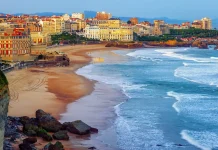Amaia Gabantxo is well known to our blog’s regular readers. Almost exactly eight years ago, on February 6, 2015, we first mentioned her and her work with the University of Chicago. We’ve always spoken about her in topics relating to Basque culture and music.
Since then, we’ve shared articles about her work as a professor and spreader of Basque culture and language in Chicago and other points in the US, as a translator and oftentimes as a singer. Even during the pandemic, we were able to share her video-poems.
On this occasion, we get to talk about her thanks to the startup of an interesting project bringing together a cultural association out of Bermeo and a choir out of Chicago.


The cultural association Kreatribü, out of Bermeo, was created a few months ago in order to promote the development of art and culture, helmed by Amaia Gabantxo, Iñigo Iriondo (Gatom), and Josu Urkidi.
The Chicago-based choir Uniting Voices Chicago (formerly Chicago Children’s Choir) has almost 70 years of history. Their quality work as a choir has been overshadowed by their hard work creating and maintaining a vast network of school and extracurricular programs attended by thousands of students every year. The choir was founded in 1956 during the Civil Rights movement on the belief that music is an essential way to foster empathy and respect among youths of all races, ethnicities, socio-economic backgrounds, religions, sexual identities, and sexual orientations.
In its long history, more than 40,000 young people have passed through it, most of them from low- to medium-income households. This organization makes high-level musical education available to all the young people of the city.
How did this Bermeo—Chicago connection come about? Amaia Gabantxo herself tells us:
“To sing, [Uniting Voices Chicago] is always looking for songs from different and significant cultures, and for their 2022–23 program, they took an interest in Basque music. I had already left a small mark on the Chicago music scene over the ten years I was living there, and one of the choir directors found me, now back in Bermeo, during the pandemic, and here we are, with direct connections via internet, explaining to the boys and girls of Chicago how to sing these songs from the repertoire of Basque music, in the Basque language. While the singers were learning our songs, we were preparing a soundscape, with sounds from the nature surrounding us here, and urban sounds that the little ones (and not so little ones) sent us from Chicago. With that soundscape, we’ll instrumentalize the piece that is made up of two songs in Basque.”
We think this is an extraordinary project, full of meaning and symbolism, bringing together not only different cultures, but two different worlds: a small town on the Basque coast, and one of the largest metropoles in the US.


Interestingly, the location where these two Basque songs will be heard on May 25, 2023, is an open-air auditorium known as the Pritzker Music Pavilion, which can seat 11,000 people. It was designed by Frank Gehry, and its construction began in 1999, two years after the opening of the building that would change the image of the Basques in the world, the Bilbao Guggenheim Museum.
We’ll continue to follow this project closely, and we’ll keep you posted. We do hope that, when the time comes, we can bring you these songs. For the moment, even the names of the songs are a closely-guarded secret.
For now, we have two videos where the members of Kreatribü explain the project (subtitles in Spanish and English), and a video from Uniting Voices Chicago (automatic subtitles available) explaining the mission and goals of the project. Finally, there is an explanatory text of the project Kreatribü is carrying out.
More information on this event here.
Last Updated on Dec 3, 2023 by About Basque Country





